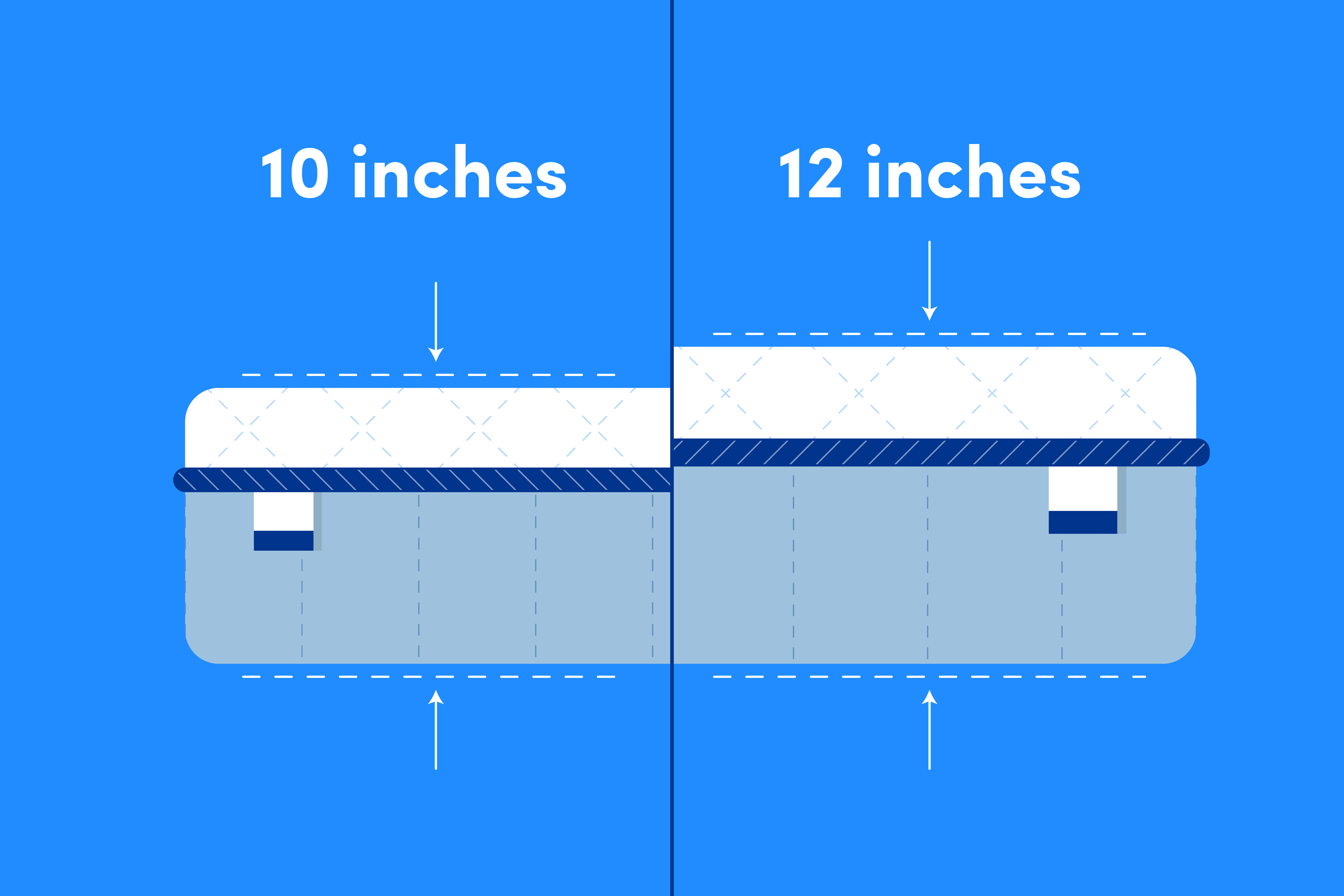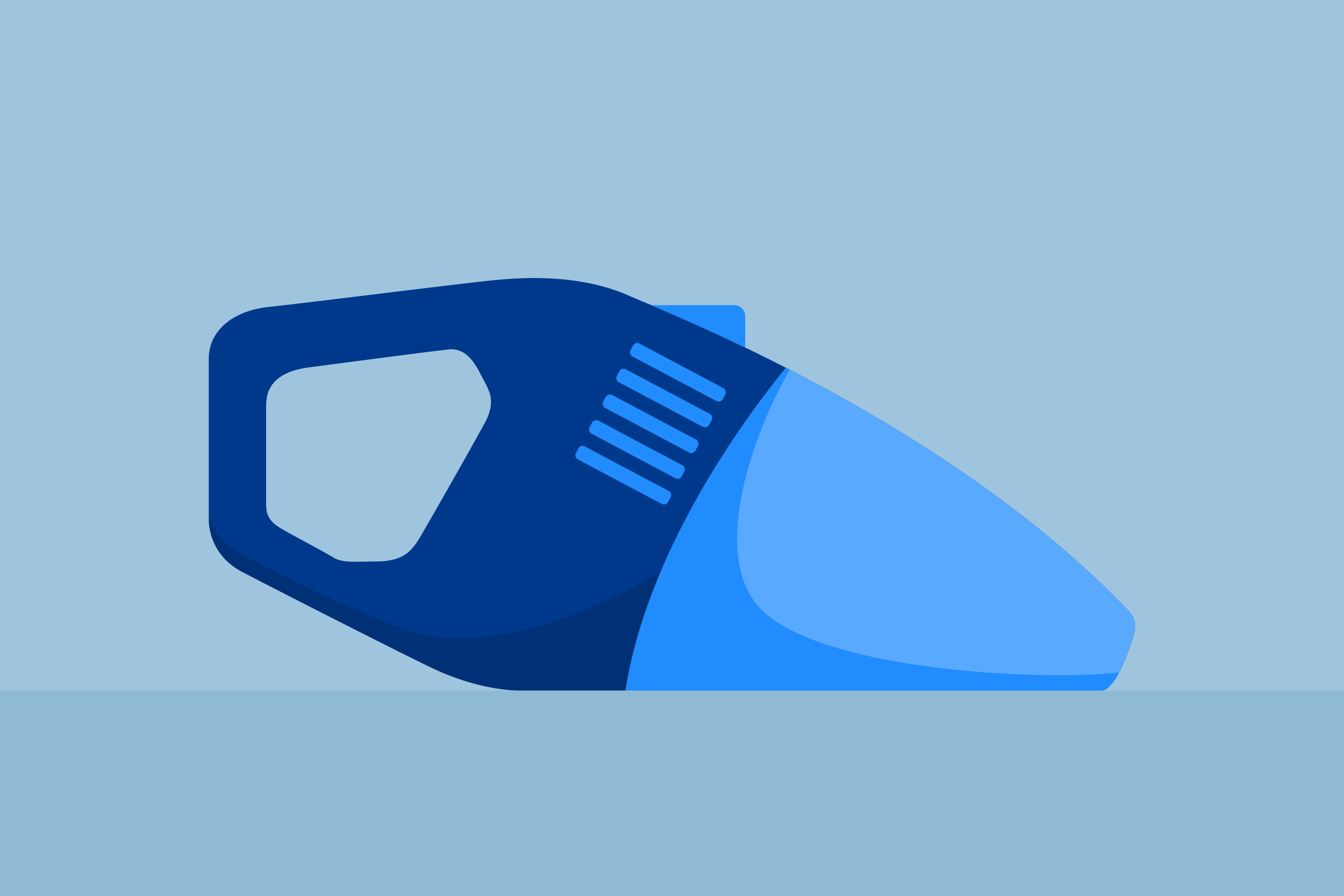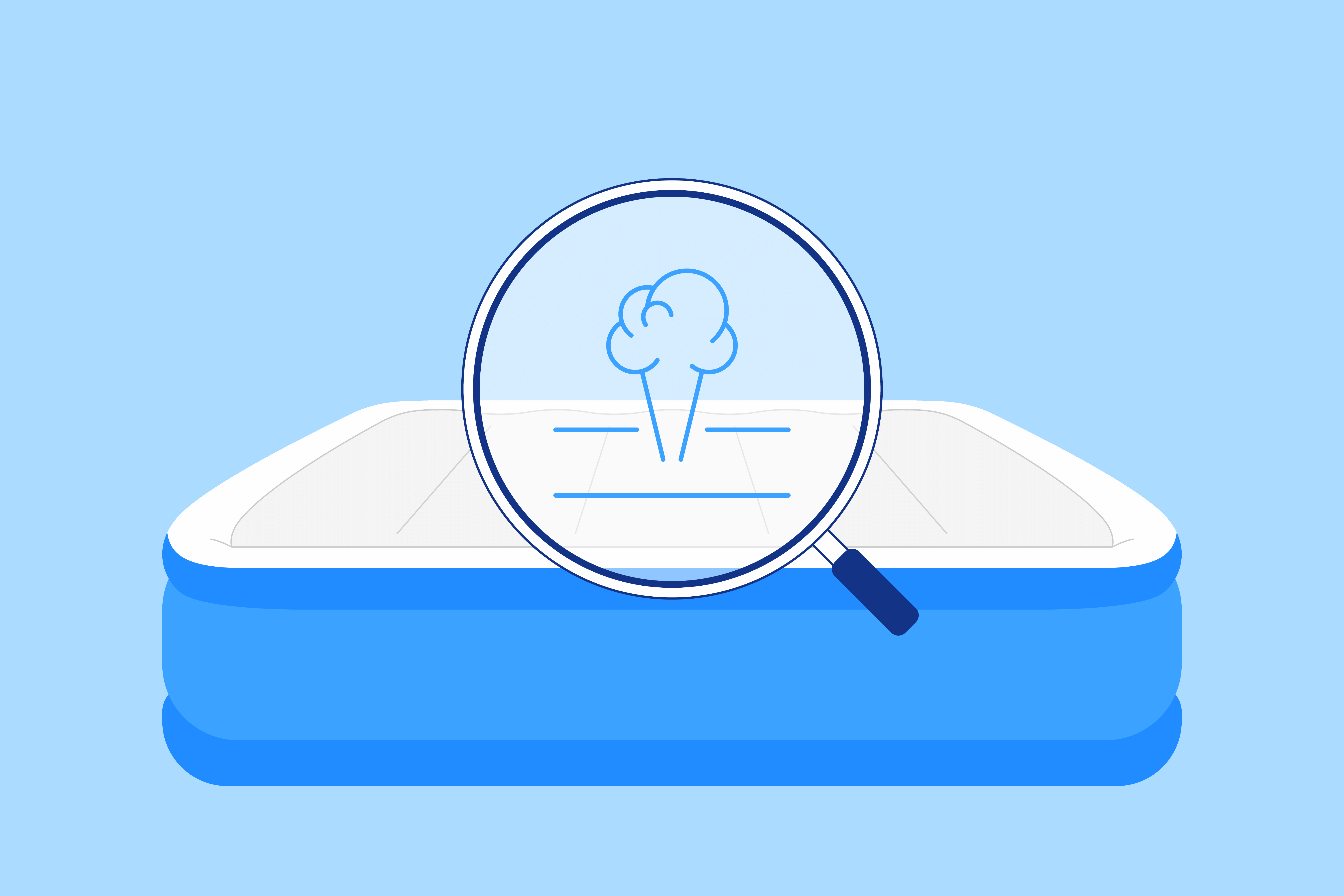Key Takeaways
- Customized Comfort: The choice between a 10-inch and a 12-inch mattress depends on individual preferences, body type, and sleeping habits. Understanding the concept of mattress thickness and the composition of comfort and support layers is crucial for selecting a mattress that aligns with your specific sleep needs.
- Versatility in Sleeping Positions: Thicker mattresses, like the 12-inch option, often provide enhanced support and cushioning, making them suitable for side sleepers who benefit from added comfort. Thinner mattresses, such as the 10-inch choice, can be preferred by those who prefer a firmer sleep surface or sleep on their stomachs.
- Consideration of Practical Factors: Factors such as bed frame height, overall bed setup, and individual mobility play a role in determining the ideal mattress thickness. Additionally, both thickness options offer benefits for different scenarios, with a 10-inch mattress being space-efficient for RVs, while a 12-inch mattress offers advanced technology, durability, and motion isolation.
Are you wondering about the differences and benefits of 10-inch vs 12-inch mattress types? Look no further! In this article, we will explore the various factors you should consider when selecting the optimal mattress thickness for your sleep comfort.
Understanding mattress thickness is crucial in determining the level of comfort and support you need for a restful night’s sleep. Join us as we delve into the world of memory foam, innerspring, and latex foam mattresses. Learn about the different layers that make up each mattress, including comfort layers and support layers.
We will also discuss the factors to consider, such as your sleeping position, body type, and sleeping habits when deciding between a thinner or thicker mattress. Choosing the right mattress thickness is key to achieving a good night’s sleep, along with other key features like firmness level and mattress material.
Quick Guide: A 30-Second Summary
| Best 12-Inch Mattress Overall | Amerisleep AS3 |
| Best 12-Inch Mattress for Back Pain | Amerisleep AS2 |
Understanding Mattress Thickness
Before deciding between a 10-inch or 12-inch mattress, it’s important to understand the concept of mattress thickness.
A mattress typically consists of multiple layers, including comfort layers and support layers. The comfort layer, which is usually made of materials like memory foam, latex foam or innerspring, forms the topmost layer of the mattress and provides cushioning and pressure relief.
While the issue of heat retention may vary among thick mattresses, examining the materials they are composed of can assist you in making a decision. For instance, innerspring mattresses do not encounter heating problems, regardless of their thickness. Consider these factors to ensure a comfortable and restful night’s sleep.
Thicker mattresses often have more comfort layers or added transition layers, allowing for additional cushioning and support. This can make them a great option for side sleepers or individuals who prefer a softer sleep surface.
In contrast, thinner mattresses may have a thinner comfort layer but can still offer adequate support, especially for those who prefer a firmer sleep surface. For added comfort and support with a thinner mattress, consider using a mattress topper, which provides an additional layer of softness to enhance the overall feel of your mattress.
It’s important to note that thickness does not necessarily equate to comfort or support. The ideal mattress thickness depends on individual preferences, body type, and sleeping habits. Some individuals may prefer thinner comfort layers, while others may require more cushioning for optimal sleep comfort.
Benefits of a 10 Inch Mattress
Are you looking for a thinner mattress option? A 10-inch mattress may be just what you need. Despite its slim size, it can still provide ample support and comfort.
While some people may assume that a thinner comfort layer means less comfort, that’s not necessarily true. In fact, some people find a firmer sleep surface more comfortable, and a 10-inch mattress can provide just that. It can also be a suitable choice for those who prefer slim mattresses or are looking for a budget-friendly, affordable mattress.
One great benefit of a 10-inch mattress is that it can be a great option for those who sleep on their stomach. It provides a firmer sleep surface that can help prevent your spine from curving unnaturally.
Additionally, it can be a good choice for individuals with smaller bed frames or specialty frames like bunk beds, Murphy beds or trundle beds. And it can be excellent for those with limited vertical space in their bedrooms, such as a bedroom with slanted walls and ceilings.
A 10-inch mattress can also be a good choice as an RV mattress for its size and weight. RVs often have limited space, and a 10-inch mattress provides a comfortable sleeping surface without taking up too much vertical space. This is crucial in the confined quarters of an RV. A thinner mattress should also place less drag on the vehicle than a thicker, and consequently heavier, mattress model.
Benefits of a 12 Inch Mattress
One of the primary advantages is how a 12-inch mattress often incorporates advanced sleep technology and high-quality materials. These mattresses frequently feature multiple layers, including memory foam, latex, or other specialized materials, each serving a specific purpose. Meanwhile, the thicker support layer in a 12-inch mattress can ensure enhanced durability and longevity, allowing you to enjoy a peaceful night’s sleep for years to come.
By creating a sleep surface that maximizes comfort and durability, a 12-inch mattress can be an investment in long-term sleep quality. Moreover, they tend to offer enhanced support for the body. The extra thickness provides additional layers of padding and support materials, ensuring that the mattress contours to the body’s natural curves, relieving pressure points and promoting better spinal alignment.
This can be particularly beneficial for individuals with back pain or joint issues, as the increased thickness contributes to a more comfortable and restorative sleep. Side sleepers or individuals who prefer a softer mattress can benefit significantly from the added cushioning provided by a thicker mattress.
Additionally, the extra thickness contributes to mattress motion isolation. When sharing a bed, the thicker construction helps minimize the transfer of motion across the mattress. This means that movements from one side of the bed are less likely to disturb a partner on the other side, fostering uninterrupted sleep for both individuals.
This mattress thickness can be especially advantageous for couples with different sleep schedules or preferences.
Factors to Consider in Choosing the Right Mattress Thickness
Choosing the best mattress thickness is crucial for a good night’s sleep. When deciding between a 10-inch and 12-inch mattress, it’s important to consider several factors.
Ultimately, the right mattress thickness depends on personal preference and individual needs. Consider your sleeping position, body type, and sleep habits when choosing between a 10-inch and 12-inch mattress to ensure a comfortable and restful night’s sleep.
Ideal Mattress Firmness
The ideal firmness for your mattress also depends on your weight, sleeping habits, and body type.
Sleeping Position
Your preferred sleeping position is a crucial factor to consider. Side sleepers might benefit from the extra cushioning provided by a 12-inch mattress, while stomach sleepers may find a 10-inch mattress more supportive. However, it’s often better to be guided by firmness than thickness:
- The best mattresses for side sleepers should have a soft to medium feel.
- The best mattresses for back sleepers often rely on firmer feels, medium-firm to firm.
- The best mattresses for stomach sleepers typically possess firm feels.
- The best mattresses for combination sleepers usually deliver responsive medium to medium-firm feels.
Body Type and Sleeping Habits
Body type and sleeping habits are additional factors to consider. Heavier sleepers over 230 pounds may benefit from the additional support provided by a thicker mattress, while lightweight sleepers under 130 pounds may find a thinner mattress for petite sleepers more comfortable.
However, lightweight sleepers often benefit from a softer mattress that quickly embraces their curves, and this mattress firmness usually means a thicker mattress. Meanwhile, a mattress for heavier sleepers typically leans firmer to better support the body, and this can mean a thinner mattress.
Sleep Quality
The quality of your sleep also plays a role in choosing the right mattress thickness. If you suffer from chronic pain or other sleep-related issues, a thicker mattress may provide the extra comfort and support you need. You may also need a thicker mattress for special features like zoned support or mattress edge support.
Support Layer
The support layer of a mattress is often overlooked but is essential for ensuring proper spinal alignment and support. Whether you prefer a thicker or thinner mattress, consider the quality and effectiveness of the support layer.
A good mattress support layer should maintain durability over time, preventing mattress sagging or body impressions, and contribute to a comfortable and supportive sleep surface. High-quality materials, such as individually pocketed coils or dense foam, often define a reliable support layer in mattresses, ensuring a solid foundation for a restful night’s sleep.
Durability
While thickness alone doesn’t guarantee durability, it can be a contributing factor to how long a mattress lasts. Thicker mattresses often have more room for robust support layers and additional materials, which can enhance their overall durability.
As we mentioned, the support layer, often found at the core of the mattress, plays a crucial role in maintaining structural integrity over time. A thicker mattress allows for the incorporation of high-quality materials that resist sagging and indentations to create one of the most durable mattresses. However, it’s essential to consider the overall construction, quality of materials.
Bed Frame Height
Selecting the appropriate mattress thickness is closely tied to the height of the bed frame, as the combination of frame and mattress determines overall bed height. If you plan on using a box spring, bunkie board, or mattress topper, it should also be considered when calculating bed height.
The goal is to strike a harmonious balance between the mattress thickness and the bed frame height, ensuring not only aesthetic cohesion but also practical considerations such as ease of getting in and out of bed.
There are also ways to make a bed taller without going for a thicker mattress. For example, a set of bed risers can offer a few extra inches.
FAQs
Is a 10 inch mattress good for 2 people?
The suitability of a 10-inch mattress for two people depends on personal preferences and comfort levels. Generally, a 10-inch mattress can provide adequate support and comfort for couples. However, factors such as individual preferences, body weight, and sleeping positions should be considered. Mattress models also vary widely, and some 10-inch mattresses are better made than others.
We suggest you try the mattress in question for yourself and assess whether it meets the comfort needs of both individuals.
Is a 12 inch mattress too high?
Whether a 12-inch mattress is too high depends on individual preferences and the overall bed setup. While a 12-inch mattress can offer additional height and support, some people may find it too tall, especially if it’s combined with a high bed frame.
Consider the height of the bed frame, your own height, and any potential difficulty in getting in and out of bed before deciding if a 12-inch mattress is suitable for you.
What is the best thickness for a mattress?
Determining the best thickness for a mattress involves considering personal comfort preferences and individual needs. While there is no one-size-fits-all answer, many people find that a mattress thickness in the range of 10 to 12 inches provides a good balance of support and comfort. Others may want an even thicker mattress, 14 or 15 inchs tall, for extra softness.
Factors such as body weight, sleeping position, and any specific health concerns should also be taken into account when choosing the mattress thickness that suits you best.
What are the benefits of a 12-inch mattress?
The benefits of a 12-inch mattress can include enhanced support, improved durability, and potential relief for pressure points. A thicker mattress can provide better contouring to the body, reducing the risk of discomfort or pain. Additionally, the increased thickness often allows for more layers of supportive materials, contributing to a more luxurious and comfortable sleep experience.
Are thicker mattresses better for back pain?
Thicker mattresses are often considered better for back pain as they tend to provide more support and better spine alignment. A thicker mattress can distribute body weight more evenly, reducing pressure on the lower back and minimizing the risk of discomfort. Some may also have special features like zoned lumbar support, too.
However, individual preferences and the specific causes of back pain may vary, so it’s essential to try different mattresses and seek professional advice if needed.
Can a mattress be too thick?
While thicker mattresses are generally preferred by those seeking additional support, a mattress can be too thick for some individuals. Factors such as personal comfort preferences, bed height considerations, and ease of mobility should be taken into account. Some people may find that excessively thick mattresses make it difficult to get in and out of bed comfortably.
So it’s important to strike a balance that meets both comfort and practicality.
Conclusion
Choosing the right mattress thickness is crucial for achieving optimal sleep comfort and ensuring a good night’s sleep. When it comes to mattress selection, it’s important to consider your sleeping position, body type, and personal preferences.
Both a 10-inch and a 12-inch mattress have their unique benefits. A 10-inch mattress can be a great option for those who prefer a firmer sleep surface or have limited bedroom space. On the other hand, a 12-inch mattress can provide extra comfort and cushioning, making it ideal for side sleepers or those who enjoy a softer sleep surface.
Ultimately, the right thickness for your mattress depends on what will provide you with the most optimal sleep. Consider the level of support and comfort you need and select the mattress that aligns with your needs. With the right mattress, you can ensure a good night’s sleep and wake up feeling refreshed and rejuvenated.
About the author
Mitchell Tollsen is a graduate student and a freelance writer who’s contributed to the Early Bird blog for three years. Mitchell’s always been fascinated by the science of sleep and the restorative processes our bodies undergo when at rest. The self-titled “Sleep Expert” is always looking for ways to improve his shut-eye, and throughout the years has implemented numerous lifestyle changes and tried dozens of sleep-promoting gadgets to determine the best ways to truly get better rest.
View all posts





